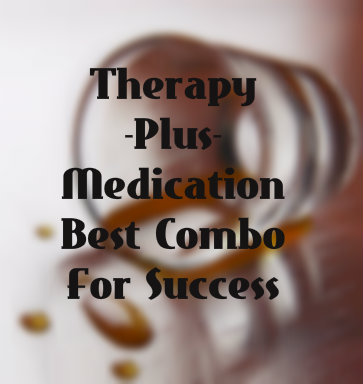Psychotherapy Plus Medication Helps Alcoholics Abstain
Addiction specialists and other health professionals have a range of medication-based options for helping people affected by alcoholism. However, even when they receive one of these medications, some recovering alcoholics still lapse back into heavy alcohol consumption. In a study published in April 2014 in the journal Alcoholism: Clinical & Experimental Research, researchers from three German institutions assessed the effectiveness of individualized psychotherapy in recovering alcoholics who don’t respond sufficiently to medication-based treatment. Specifically, the researchers examined the usefulness of a form of individualized therapy called cognitive behavioral therapy.
What Medications Can Help Alcoholics?
 As of 2014, the U.S. Food and Drug Administration has approved a trio of medications for use in people recovering from alcoholism: naltrexone (Vivitrol), disulfiram (Antabuse) and acamprosate (Campral). Naltrexone is an anti-opioid medication that also blocks the chemical reactions responsible for triggering pleasurable sensations and alcohol cravings in drinkers. Disulfiram deters alcohol consumption by exaggerating the unpleasant chemical reactions associated with the breakdown of alcohol inside the body. Acamprosate makes chemical changes inside the brain that typically lessen the intensity of the alcohol withdrawal symptoms that commonly contribute to relapse risks in recovering alcoholics. Doctors also sometimes use a fourth medication, called topiramate (Topamax), not initially intended for use in alcoholism treatment. This anti-seizure compound also makes changes in the brain’s chemical environment that can help lower the odds that recovering alcoholics will take a drink.
As of 2014, the U.S. Food and Drug Administration has approved a trio of medications for use in people recovering from alcoholism: naltrexone (Vivitrol), disulfiram (Antabuse) and acamprosate (Campral). Naltrexone is an anti-opioid medication that also blocks the chemical reactions responsible for triggering pleasurable sensations and alcohol cravings in drinkers. Disulfiram deters alcohol consumption by exaggerating the unpleasant chemical reactions associated with the breakdown of alcohol inside the body. Acamprosate makes chemical changes inside the brain that typically lessen the intensity of the alcohol withdrawal symptoms that commonly contribute to relapse risks in recovering alcoholics. Doctors also sometimes use a fourth medication, called topiramate (Topamax), not initially intended for use in alcoholism treatment. This anti-seizure compound also makes changes in the brain’s chemical environment that can help lower the odds that recovering alcoholics will take a drink.
Cognitive Behavioral Therapy
Practitioners of cognitive behavioral therapy (CBT) help their patients/clients identify the underlying feelings, perceptions and actions that contribute to dysfunctional behavior in stressful situations. After making this identification, the individual can gradually learn a new set of feelings, perceptions and actions that don’t help trigger destructive behaviors. In the context of addiction treatment, CBT practitioners specifically help their patients/clients learn to do such things as anticipate the situations likely to increase the urge to use drugs or alcohol, learn how to cope with those situations without using drugs or alcohol, identify substance-using urges as soon as possible and accurately weigh the pros and cons of using drugs or alcohol.
Cognitive behavioral therapy is suitable for use in both individualized and group formats. In addition, the therapy can be used on its own or in combination with medication-based addiction treatment. In addition to alcoholism, forms of addiction addressed by CBT include addiction to the stimulants methamphetamine and cocaine, marijuana addiction and addiction to the nicotine contained in cigarettes and other tobacco products.
Usefulness In People Not Helped By Medication
In the study published in Alcoholism: Clinical & Experimental Research, researchers from Germany’s Freiberg University, Tubingen University and Heidelberg University used an examination of 109 individuals to assess the effectiveness of an individualized cognitive behavioral approach in helping recovering alcoholics who don’t receive enough benefit from medication-based treatment. All of these individuals were alcohol program participants who had experienced severe relapses back into drinking after taking an alcoholism medication, or after receiving a placebo that mimicked the appearance of an alcoholism medication. During the study, half of the participants continued to receive a standard combination of medication and medical symptom management. The other half received a combination of medication, medical symptom management and cognitive behavioral therapy conducted on an individualized basis.
The researchers analyzed the effectiveness of individualized CBT in all of the participants originally assigned to the therapy group, as well as the effectiveness of the approach in all of the participants who actively engaged in therapy. After completing these analyses, they concluded that the recovering alcoholics who actively engaged in the CBT process received a substantial benefit from the therapy and experienced improved treatment outcomes when compared to the recovering alcoholics who received only medication and medical symptom management.
The chief measurement used to compare the effectiveness of the combination of medication and individualized cognitive behavioral therapy to the effectiveness of medication without CBT was the number of days recovering alcoholics could successfully avoid experiencing another severe relapse. The authors of the study published in Alcoholism: Clinical & Experimental Research concluded that those program participants who actively embrace the goals of individualized CBT can potentially increase the number of days between relapses if they combine the therapy with an alcoholism medication. In line with this conclusion, they believe that alcohol programs may see significant improvements in their patients’/clients’ relapse-related outcomes if they offer access to non-medication-based therapy early in the treatment process.
Read How Do Recovering Alcoholics Respond To Baclofen?



